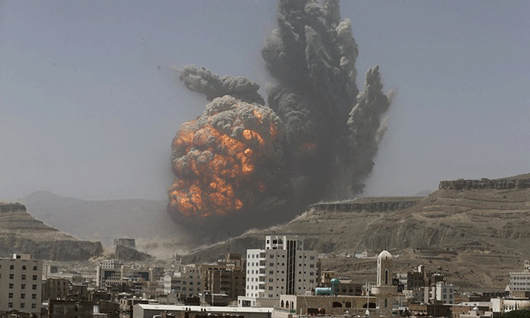
By Sophia Akram
Last Wednesday, 6 January 2016, a residential neighborhood in Sana, Yemen, was bombarded from the air.
The deliverer was a Saudi Arabia led coalition aircraft and the package, munition known as cluster bombs.
Yemen has been at war since --- the Houthi Ansarullah forces --- forced President Hadi to flee the capital and a civil War has ensued, with a split between Sunni Government backed forces and Shiite aligned forces supporting the Houthis. One of those aligned with the Government are Saudi Arabia, who are leading an offensive with a coalition involving five other states (Egypt, Jordan, Morocco and Sudan).
While the involvement of Saudi Arabia is controversial, their use of cluster munitions has been deemed illegal. Cluster bombs are devices that release lots of smaller munitions - ’bomblets’ - that are aimed to destroy vehicles or harm and kill persons on the ground.
There is an international campaign to ban cluster bombs completely and their use is thought to violate the laws of war, as they are indiscriminate in nature because those releasing them can’t be sure where they will strike. They also tend to be released in populated areas and so civilian casualties are inevitable.
The cluster bomb was found near al-Zira’a Street in Sana’a and the markings recovered by Human Rights Watch.
The CBU-58 cluster bomb, which contains 650 submunitions, was manufactured in 1978 at the Milan Army Ammunition Plant in Tennessee.
The fact that the bomb was found in a crowded area illustrates intent to cause civilian harm - a war crime - whether or not they were targeted at Military objects.
Residents also confirmed that they witnessed effects of a cluster bomb detonating by hearing several small explosions and seeing the pockmarks from the bombs at a local kindergarten, on vehicles and in homes.
The Human Rights charity examined export records and found that the US did export 1,000 CBU-58s between 1970 and 1995. The US is a party to the conflict by providing support to the coalition. Therefore, it has an obligation to ensure that those they are supporting are not violating rules of war and to investigate allegations.
While none of the coalition are party to the Convention on Cluster Munitions, the fact they are being used in populated areas contravenes the international law of armed conflict because it is not taking steps to avoid civilian casualties.
By approving a billion dollar munitions sale to Saudi Arabia, the US is not complying with this duty and furthermore, a US official disclosed in August last year that they knew that Saudi were deploying cluster bombs in Yemen.
Cluster munitions can cause severe damage on par to landmines and should not be used in this conflict. An investigation needs to go underway and those responsible held to account.